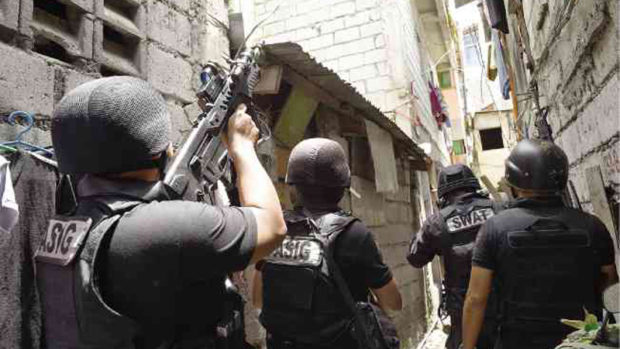Drilon says drug war data are public record, has ‘no national security implications’

BATTLE-READY Members of a Special Weapons and Tactics (SWAT) police team raid a house in a Pasig City slum to serve a search warrant as part of President Duterte’s deadly campaign against illegal drug trafficking. AFP FILE PHOTO
MANILA, Philippines — Records of the Duterte administration’s brutal drug war do not have national security implications, Senate Minority Leader Franklin Drilon stressed, pointing out the public’s right to “know the truth.”
“To claim that it involves national security is unfounded. By any stretch of the imagination, I could not think how would a single poorest of the poor Filipino, who was killed in an anti-narcotics operation, have planned to overthrow the government?” Drilon said in a statement.
“How the likes of Kian delos Santos and many young victims of the anti-drug campaign could have threatened our national security?” he added.
A former justice secretary, Drilon said the Supreme Court had earlier ruled that drug war records “do not obviously involve state secrets affecting national security.”
He noted that in two cases against the Philippine National Police (PNP) in 2018, the Supreme Court “denied the Office of Solicitor General’s defense that drug war records could implicate national security in a bid to stop the sharing of the police records.”
Further, he said that during his stint as justice chief, he has “never seen police records that have national security implications.”
“What we want to find out is what, where, when, and under what circumstances these thousands of people were killed. The police records will reveal only that information,” he added.
The minority leader’s statement comes after President Rodrigo Duterte said the government cannot give rights groups full access to drug war records due to national security issues.
But Drilon said that in accordance to the high court’s decision, drug war records “do not involve rebellion, invasion, terrorism, espionage, infringement of our sovereignty or sovereign rights by foreign powers, or any military, diplomatic or state secret involving national security.”
“That is, plain and simple, a police blotter. Ito po ay public record at may karapatan ang taumbayan na malaman ang katotohanan,” the senator said.
The PNP, Drilon added, must follow the rule of law.
“Th PNP is walking on a thin line between following the high court’s order or keeping the records under wraps. But they must abide by the court ruling,” he said. “Wala naman po tayong tinatago, hindi po ba?”
Duterte made his clarification on the drug war records after the Commission on Human Rights (CHR) lauded the Philippine National Police (PNP) and its new chief, Gen. Guillermo Eleazar, for opening some of its drug war records for scrutiny.
Eleazar allowed the Department of Justice (DOJ) to take a look at 61 drug war cases as part of its probe of the administration’s bloody campaign against illegal drugs.
Presidential spokesperson Harry Roque, meanwhile, said that what Duterte was referring to did not pertain to the DOJ’s access to police records, but to sensitive information about “ongoing police investigations,” which are part of the “traditional exception to the right to information.”































